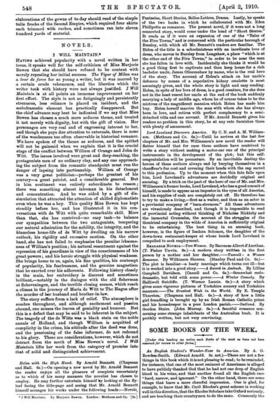NOVELS.
I WILL MAINTAIN.*
HAVING achieved popularity with a novel written in her teens, it speaks well for the self-criticism of Miss Marjorie Bowen that she should have refused to be content with merely repeating her initial success. The Viper of Milan was a tour de force for so young a writer, but it was marred by a certain crude vehemence, and the liberties which the writer took with history were not always justified. I Will Maintain is at all points an immense improvement on her first effort. The style is not so fatigningly and persistently strenuous, less reliance is placed on incident, and the melodramatic element has practically disappeared. But the chief advance may best be indicated if we say that Miss Bowen has chosen a much more arduous theme, and treated it not merely with dignity, but with the gift of vision. Her personages are very real and of engrossing interest to her,
and though she pays due attention to externals, there is none of the woodenness too often observable in historical romance. We have spoken of the theme as arduous, and the epithet will not be gainsaid when we explain that it is the crucial stage of the conflict between William of Orange and John de Witt. The issues involved were great and deep-reaching, the protagonists men of no ordinary clay, and any one approach- ing the subject from the romantic standpoint must run the danger of lapsing into partisanship. William of Orange was a very great politician—perhaps the greatest of his century—a great patriot, and a considerable general. But in him sentiment was entirely subordinate to reason ; there was something almost inhuman in his detachment and concentration. And he was aided by a gift of dis- simulation that attracted the attention of skilled diplomatists even when he was a boy. This quality Miss Bowen has kept steadily before her, and has illustrated it in his con- versations with de Witt with quite remarkable skill. More than that, she has contrived—no easy task—to balance our sympathies between the two antagonists, tempering our natural admiration for the nobility, the integrity, and the blameless home-life of de Witt by dwelling on his narrow outlook, his rigidity and excessive caution. On the other hand, she has not failed to emphasise the peculiar irksome- ness of William's position; his natural resentment against the repression of hie guardians in view of the consciousness of his great powers ; and his heroic struggle with physical weakness. She brings home to us, again, hia fine qualities, his contempt of popularity, his fearlessness, and the genuine magnetism that he exerted over his adherents. Following history closely in the main, her embroidery is discreet and sometimes brilliant,—notably in the dialogue with the old fisherman at Scheveningen, and the terrible closing scenes, which reach a climax in the journey of Maria de Witt to The Hague after the murder of her husband and brother-in-law.
The story suffers from a lack of relief. The atmosphere is sombre throughout, and although excitement and passion abound, one misses the leaven of geniality and humour. But this is a defect that may be said to be inherent in the subject. The tragedy of the de Witte was a. black stain on the noble annals of Holland, and though William is acquitted of complicity in the crime, his attitude after the deed was done, and the pensioning of the false informer, do not redound to his glory. These are considerations, however, which do not detract from the merit of Miss Bowen's noveL / Will Maintain lifts her work from the category of promise into that of solid and distinguished achievement.










































 Previous page
Previous page